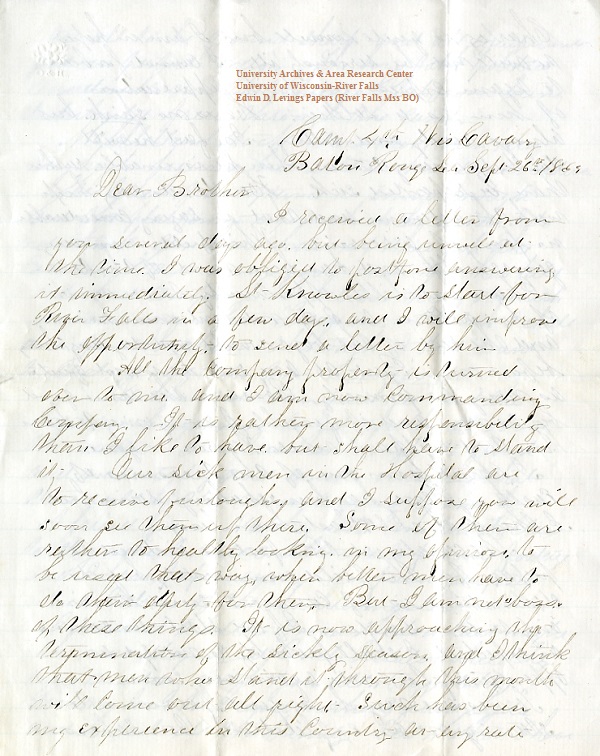The following small articles are from The Polk County Press of November 26, 1864. The Prescott Journal published only two pages on the 26th, the front page being all advertisements and the second page being all county government business.
– POPULAR VOTED.–Lincoln’s majority on the popular vote is over 400,000. This is the largest popular majority ever given any President of the United States. [Abraham Lincoln]
From the Tenth Wis. Battery.
MARIETIA, Ga., Nov. 10, 1864.
SAM. S. FIFIELD, JR.—Dear Sir :—I comply with your request and hasten to forward to you the result of our election. The number of votes cast by Polk County boys was nine. Of this number Lincoln received 9 ; McIndoe 9 ; Stuntz 9 ; and Nason and Fisk 9. Mack nary a vote [George B. McClellan]. You will perceive that we vote in the same direction we shoot.
You may look for stiring [sic] news from this army within the next two months. We are stripping ourselves for the fight again, and if this rebellion does not receive blows that will make the cursed traitors cry enough, then I am fearfully mistaken—that’s all. Boys all well. Yours truly,
O. A. CLARK,
Tenth Wisconsin Battery.
– FRONTIER PROTECTION.–General SIBLEY has stationed a company of cavalry at Chengwatona, Pine Co., Minn. [Henry Hastings Sibley]
– Pierce County gives Lincoln 300 majority. Every town gives Union majority, which is a heavy gain.
– From the 44th Regiment.–Our friend Seth Ayers writes us under the 12th inst., from Nashville, Tenn. All the boys were well. The election among the soldiers was all one way, Lincoln receiving four-fifths of the votes. The Polk Co. boys in the regiment voted as follows:
Lincoln 6, [Walter D.] McIndoe 6, Stuntz 3, & Nason 3. Democratic nary one.
– Ten thousand prisoners are now being exchanged at Savannah, Ga.
– An engineer officer says that Sheridan [Philip H. Sheridan] has captured in the Valley one mile and 82 yards of artillery, an average of two pieces a day since he took command. [Shenandoah Valley]
Congratulatory Dispatch from Gen. GRANT
The Washington Star publishes the following dispatch from Gen. Grant [Ulysses S. Grant] :
To Hon. E. M. Stranton :
CITY POINT, Nov. 10, 1864, 10:80 P.M.–Enough now seems to be known to say who is to hold the reins of Government for the next years. Congratulate the President for me for the double victory. The election having passed off quietly—no bloodshed or riot throughout the land—is a victory worth more to the country than a battle won. Rebelldom [sic] and Europe will construe it.
U. S. GRANT, Lt. Gen.
Little Mac Resigns—Sheridan Promoted.
NEW YORK, Nov. 16.
GENERAL ORDERS 282.
WAR DEPARTMENT, }
Washington, Nov. 14, 64 }
Ordered by the President :
1st. That the resignation of Geo. B. McClellan, as Major General in the United States army, dated Nov. 8th, and received by the Adjutant Gen. is the 10th inst., be accepted as of the 8th of November.
2nd. That for personal gallantry, military skill, and trust in the courage and patriotism of his troops, displayed by Philip H. Sheridan in the battle of Cedar Run, whereby, under the blessing of Providence, his routed army was re-organized, a great national disaster avoided, and a brilliant victory achieved over the rebels for the third days, Philip H. Sheridan is appointed Major General in the U.S. Army to rank as such from the 8th of November, 1864.
By order of the President of the United States.
. .E. D. Townsend, A. A. G.


